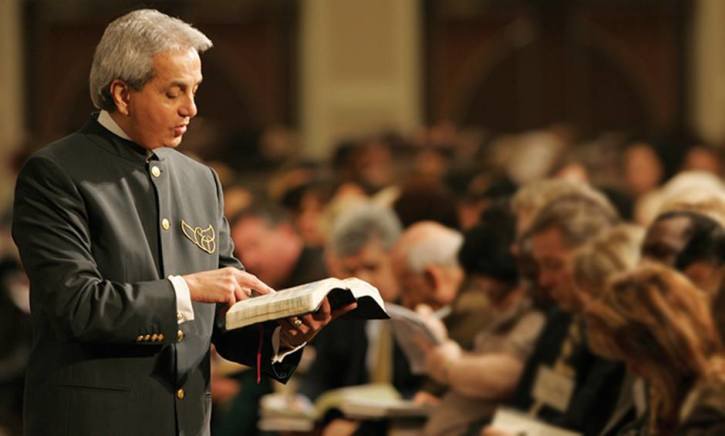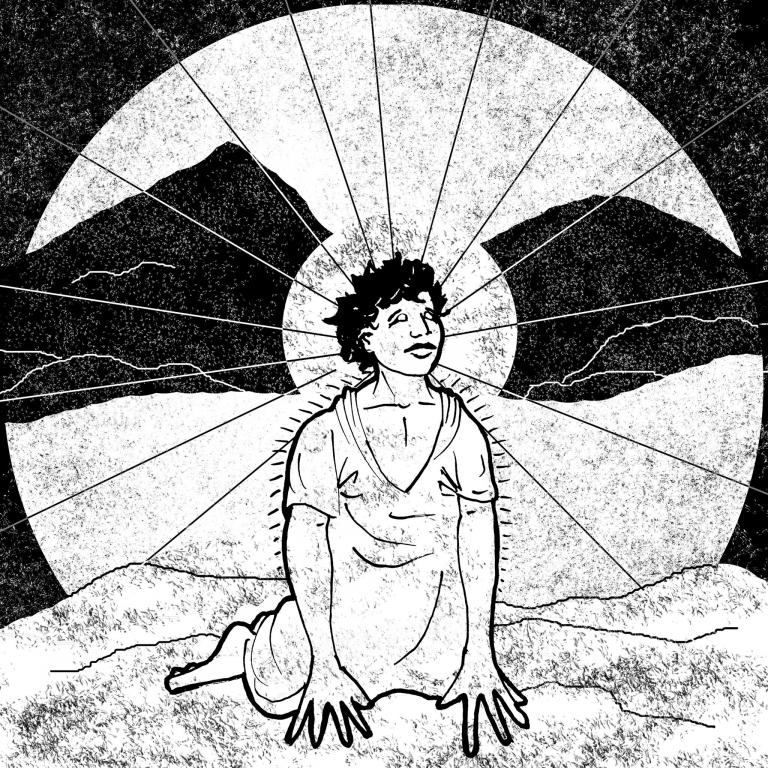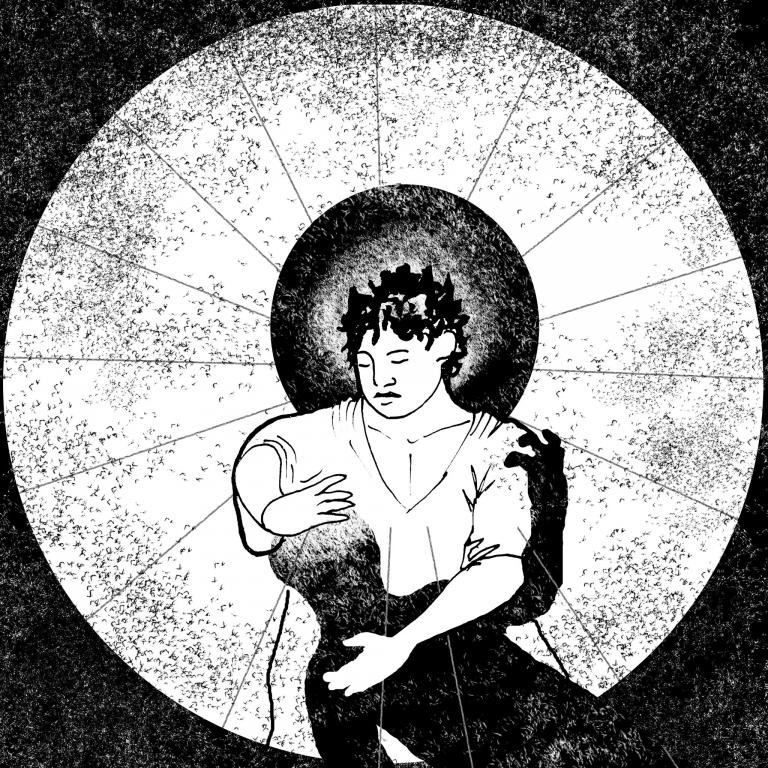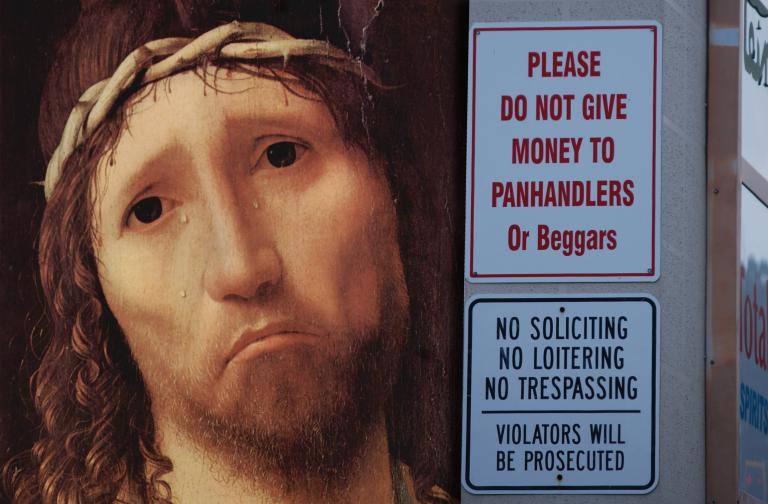A certain ruler asked him, “Good teacher, what must I do to inherit eternal life?”
“Why do you call me good?” Jesus answered. “No one is good except God alone. You know the commandments: ‘You shall not commit adultery, you shall not murder, you shall not steal, you shall not give false testimony, honor your father and mother.'”
“All these I have kept since I was a boy,” he said.
When Jesus heard this, he said to him, “You still lack one thing. Sell everything you have and give to the poor, and you will have treasure in heaven. Then come, follow me.”
When he heard this, he became very sad, because he was very wealthy. Jesus looked at him and said, “How hard it is for the rich to enter the kingdom of God! Indeed, it is easier for a camel to go through the eye of a needle than for the rich to enter the kingdom of God.”
The Gospel of Luke (and its sequel: Acts) isn’t an ethereal philosophical text. Luke doesn’t deal with wealth and poverty abstractly, rather in Luke we see poor people and wealthy people engaged directly.
We learn in this passage that it is seemingly impossible for the rich to enter the Kingdom, for probably a number of reasons including the simple truth that the kingdom belongs to the poor (Luke 6:20).
 Perhaps it is Luke’s assumption that there are no innocent independently wealthy people. Rather, Luke’s approach to poverty and wealth must be understood in light of Jubilee. According to the Hebrew Jubilee (which at the very least informed Jesus’ approach to economics), if someone has amassed wealth, it would be seen as INTRINSICALLY stealing from the poor. And, as such, it would have been unjust. Take a look at Leviticus 25 to read more on what God was going for with the Jubilee.
Perhaps it is Luke’s assumption that there are no innocent independently wealthy people. Rather, Luke’s approach to poverty and wealth must be understood in light of Jubilee. According to the Hebrew Jubilee (which at the very least informed Jesus’ approach to economics), if someone has amassed wealth, it would be seen as INTRINSICALLY stealing from the poor. And, as such, it would have been unjust. Take a look at Leviticus 25 to read more on what God was going for with the Jubilee.
I’m not advocating that Christians practice Jubilee exactly as understood in Leviticus 25 (and elsewhere). I don’t believe we should just cut-and-paste the Torah into our contemporary Christian lives and try to live it out as-is.
Nevertheless, when Jesus begins to call people into the Kingdom of God, he raises the bar on Jubilee, rather than watering it down. If you read through Christ’s teachings on wealth and poverty, it becomes apparent that Jesus wants people to live in an ongoing practice of Jubilee. The early chapters of Acts show this in practice. And we can also assume that, given early church practices and teachings on wealth and poverty, they extended their Jubilee-inspired economic practices to aliens and stranger who were, in Leviticus, excluded from Jubilee.
Whenever I talk about Jubilee, people push back. Especially if they have money. The modern USAmerican understanding of justice is quite different than the justice of Jesus. Nowhere can we find in Jesus’ jubilee vision that a wealthy person needs merely to give alms to be justified, since wealth comes from the Land, and the Land, which ultimately belongs to God, is granted to God’s people. In light of this, the wealthy aren’t called to mere charity. Charity doesn’t get at justice. Even when Jubilee ceases to be rooted in the promised land, it is still assumed that, in Christ, everything belongs to the Lord and should, therefore, be redistributed to those in need as an act of justice—not as an act of “charity.”
Before I dive back into the story of the Rich Young Ruler, I want to make a quick statement about an understanding of Jesus that often gets in the way of a healthy reading of Scripture.
We often use Jesus as an example of the downwardly-mobile. It is assumed that, in Heaven, Jesus was kinda wealthy…and that he left that all behind to slum it with the poor folks. But Jesus isn’t simply someone who decided to serve the poor. He was poor. He didn’t speak as the affluent who advocates for the poor—he spoke as a representative of the poor. I wonder if, to Jesus, it was a more condescending act to address the poor or to address the Rich Young Ruler? Maybe he looks at everyone the same—but I wonder if he held more pity for the Rich Young Ruler than he did for the poor Lepers he sometimes healed.
Whether Jesus addressed the wealthy or the poor, his goal was to call folks into a righteous relationship with God and neighbor. Jesus’ sermons and acts serve to convert the marginalized into human beings. His are acts of liberation for the oppressed and the poor.
But what of the rich and the powerful? In this encounter with the Rich Young Ruler, we see the way that they are to enter into the Kingdom. They also need to be converted into human beings.
If the poor become marginalized and dehumanized because of oppressive power and the crushing weight of social, economic, and religious systems, then the ones who wield that power and create or support those systems also become dehumanized, but in a different way.
In fact, if you read through Luke/Acts carefully, it becomes apparent that Luke isn’t simply rejecting the wealthy (it is valid to believe that Luke himself was wealthy at some point), but is instead deeply interested in the salvation of the wealthy, which requires them to divest of their wealth.
But let’s get practical. What is, ultimately, the goal of the wealthy divesting of their wealth? The goal is to share possessions—which is what we see in the early chapters of Acts. When wealthy people come to faith, they are to share everything with the poor, who receive it. But the poor and the wealthy don’t then go their separate ways, rather, they live as family. The goal of downward mobility isn’t mere charity, but solidarity.
To Luke, and to Jesus, Mammon (money) is like a false God who woos away the Rich and keeps them from being a part of the People of God. Mammon isn’t a neutral thing—it is a perilous tool that can either purchase solidarity or serve as a wall dividing the wealthy from the poor.
So, like the Rich Young Ruler, we USAmericans are being asked to embrace the Christian Jubilee.
So, given the way the early Church ran with Jesus’ economic vision (which was inspired by the Hebrew Jubilee), how should we live?











